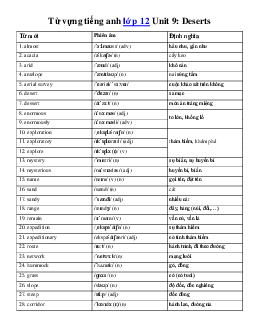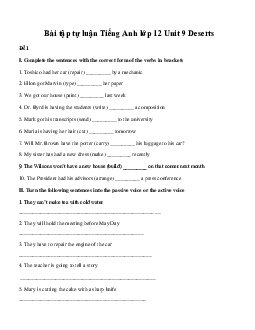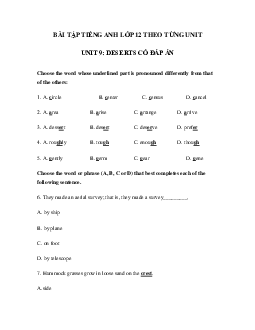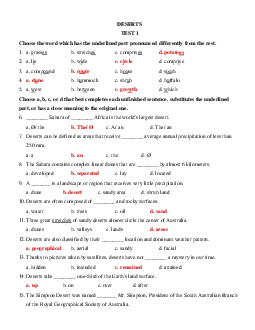










Preview text:
Giải bài tập SGK Tiếng Anh lớp 12 Unit 9: Deserts
A. Reading (Trang 96-97-98-99 SGK Tiếng Anh 12)
Before you read (Trước khi bạn đọc)
- Work in pairs. Ask and answer the following questions. (Làm việc theo cặp. Hỏi và trả lời các câu hỏi sau.)
1. What do you know about deserts? (Bạn biết gì về sa mạc?)
=> Deserts are the large areas of sand without tree and water, but with severe climates, very hot
during the day, and very cold at night. There is very little rainfall there; very few people and animals live except for in oases.
2. What kinds of plants and animals live in a desert? (Loại động thực vật nào sống ở sa mạc?)
=> In a desert, only cacti and a kind of spinifex can grow. No kind of animals can live in deserts.
3. Name some of the countries which have deserts. (Kể tên một số đất nước có sa mạc.)
=> Mexico, China, Australia, Mongolia, the USA and in North Africa ... have deserts.
While you read (Trong khi bạn đọc)
Read the passage and do the tasks that follow. (Đọc đoạn văn làm bài tập theo sau.) Hướng dẫn dịch:
Ba miền sa mạc lớn gần như bao quanh trung tâm nước Úc. Phía bắc đồng bằng
Nullabor là sa mạc Great Victoria. Ở phía tây, sa mạc Gibbon, Great Sandy và Tanami
tạo thành một vùng cát mênh mông. Phía bắc hồ Eyre là sa mạc Simpson, vùng đất cuối
cùng ở Úc được khám phá.
Sa mạc Simpson nằm giữa hồ Eyre ở phía Nam, rặng Macdonnell ở phía bắc, sông
Diamantina và Mulligan ở phía đông, sông Macumba và Finke ở phía tây. Vào năm
1845, người châu Âu đầu tiên đi vào sa mạc Simpson. Dù vậy, sa mạc này vẫn còn là
điều bí ẩn cho đến khi Madigan thực hiện một cuộc trắc lượng trên không vào năm
1929. Ông đã đặt tên sa mạc là Simpson, theo tên vị Chủ tịch chi nhánh miền nam của
Hội Địa lý Hoàng gia Úc.
Năm 1936, Colson và một thổ dân Úc cưỡi lạc đà băng qua sa mạc. Họ du hành dọc
theo ranh giới giữa miền nam nước Úc và Hạt Bắc. Ba năm sau, Madigan tiến hành một
cuộc thám hiểm khoa học băng qua các đụn cát theo một lộ trình lệch về phía bắc. Cả
Colson lẫn Madigan đều đi về hướng đông băng qua sa mạc Simpson.
Trong sa mạc Simpson có rất nhiều đụn cát. Ở khu vực phía tây sa mạc là mạng lưới
đụn cát thấp, phần lớn thấp dưới 10 mét. Cỏ đụn cát mọc ở phần cát xốp trên đỉnh, còn
cỏ spinifex mọc ở hành lang giữa các đụn cát và trên những sườn núi vững chãi hơn.
Ở phía bắc sa mạc, các đụn cát song song nhau và được chia cách bởi các hành lang đầy
cây bụi thấp và trống trải. Cỏ spinifex mọc trên sườn đụn cát. Các đụn cát ở đây thường
có màu nâu đỏ thẫm, nhưng ở khu vực giữa Queensland, Nam Úc và Hạt Bắc thì cát có
màu nhạt hơn. Các hồ nước mặn khô cạn dài đến 70 km và rộng đến 15 km nằm giữa
những đụn cát cao đến 20 m.
Task 1. Give the Vietnamese equivalents to the following words or phrases. (Cho nghĩa tiếng Việt
tương đương của những từ hay cụm từ sau.) 1. stretch: dài, trải 6. dune: đụn cát 2. sandy: có cát
7. sloping: dốc thoải thoải
3. aerial survey: trắc lượng trên không
8. steep: dốc đứng, dốc ngược
4. Royal Geographical Society of Australia: Hội 9. hummock: gò, đống địa lý Hoàng Gia Úc
5. Australian Aborigine: thổ dân Úc
10. crest: đỉnh (gò/đống)
11. spinifex: cỏ lá nhọn sống ở vùng sa mạc Úc
Task 2. Decide whether the statements are true (T) or false (F). (Xác định xem các phát biểu sau là
đúng (T) hay sai (F).) Gợi ý: 1. F 2. F 3. T 4. F 5. F 6. T
Task 3. Answer the following questions. (Trả lời các câu hỏi sau.)
1. What are the names of the three great stretches of sandy desert which circle the centre of Australia?
(Tên của 3 miền sa mạc lớn bao quanh trung tâm nước Úc?)
=> They are Great Victoria, Gibbon, Great Sandy, Tanami Deserts and Simpson Desert.
2. Where is the Simpson Desert? (Vị trí của sa mạc Simpson?)
=> It lies between Late Eyre in the south, the Macdonnel Ranges in the north, the Mulligan and the
Diamantia Rivers in the east, and the Macumba and Finke Rivers in the west.
3. When did the first European enter the desert? (Người châu Âu đầu tiên đi vào sa mạc là khi nào?) => In 1845.
4. Who was Simpson? (Simpson là ai?)
=> He was the President of the South Australian Branch of the Royal Geographical Society of Australia.
5. How did E. A. Colson and an Australian Aborigine travel across the desert? (E. A. Colson và một
thổ dân Úc đã du hành qua sa mạc bằng cách nào?)
=> They took camels across the desert.
6. What are the dunes like in the western and northern parts of the desert? (Những đụn cát ở khu vực
phía tây và phía bắc của sa mạc trông như thế nào?)
=> In the western part, they are short, mostly less than 10 meters high, and in the northern part, they
are paralell and up to 20 meters high.
7. How many kinds of grass grow in the Simpson Desert? What are they? (Có bao nhiêu loại cỏ mọc
trong sa mạc Simpson? Đó là những loại cỏ nào?)
=> Two. They are hummock grasses and spinifex.
After you read (Sau khi bạn đọc)
Read this story and answer the questions that follow. (Đọc câu chuyện này và trả lời các câu hỏi theo sau.) Hướng dẫn dịch:
Một phiên dịch người Việt đang dùng bữa tối với một doanh nhân người Mỹ trong một
nhà hàng. Bữa tối rất ngon và cả hai đều cảm thấy rất ngon miệng. Vào cuối bữa, người
phiên dịch hỏi vị doanh nhân "Ông muốn dùng gì để tráng miệng ạ?". Ngẫm nghĩ, vị
doanh nhân đáp "Cây và nước".
1. Is the story funny? (Câu chuyện có buồn cười không?) => Yes, it is.
2. Where is the fun? (Điều buồn cười ở đâu?)
=> The interpreter mispronounced the word "dessert" (tráng miệng), and that made the businessman
misunderstood that the interpreter was talking about "desert" (sa mạc). desert /ˈdezət/ : sa mạc
dessert /dɪˈzɜːt/ : món tráng miệng
B. Speaking (Trang 99 SGK Tiếng Anh 12)
Task 1. Work in pairs. Check the trees and animals that you think might exist in a desert. Explain
your choice. (Làm việc theo cặp. Hãy đánh dấu loài thực vật và động vật mà bạn nghĩ có thể tồn tại ở sa
mạc. Giải thích sự chọn lựa của bạn.) banana: chuối crocodile: cá sấu eucalyptus: cây bạc hà camel: lạc đà cactus: xương rồng fox: con chồn date palm: cây chà là dog: con chó grass: cỏ lizard: thằn lằn frog: con ếch/ngóe rabbit: thỏ horse: ngựa goat: con dê buffalo: con trâu sheep: con cừu Gợi ý:
- Date palm, cactus, grass and camel can exist in deserts because they don't need a lot
of water and can stand the severe climate there.
Task 2. Work in pairs. Find out many natural features of a desert as possible. ... (Làm việc theo cặp.
Tìm ra càng nhiều đặc điểm tự nhiên của sa mạc càng tốt. Sau đó so sánh ghi chú của bạn với của cặp
khác. Sử dụng các gợi ý bên dưới.) Gợi ý:
- Natural features of a desert: hot, cold, dry, little rainfall, much sunchine, few grasses,
few animals, few people, sandy, windy, ...
Gợi ý hỏi và trả lời:
A: What do you know about the climate in the desert?
B: It is said that it's very hot in daytime and cold at night.
A: Please tell me about the rainfall. How often does it rain there?
B: It rarely rains there so everything is very dry.
Task 3. Work in groups. You are going on an expedition across a desert with some ... . (Làm việc
nhóm. Bạn sắp đi thám hiểm sa mạc với một vài người bạn. Thảo luận và lựa chọn 5 thứ quan trọng
nhất mà bạn nên mang theo. Giải thích sự lựa chọn của bạn.) a knife: con dao a gun: khẩu súng a horse: con ngựa food: thực phẩm a box of match: diêm quẹt a car: xe hơi a camel: con lạc đà a blanket: chăn, mền water: nước a mosquito net: màn,
a cell phone: điện thoại di a walkman: máy nghe mùng động nhạc Gợi ý:
A: What should we bring with us?
B: First of all, I think we should have camels. We can't use a car because there are no petrol stations
in a desert and we can't store enough petrol for a expedition.
C: Next we should bring enough food, maybe canned food, and water as there are no shops and water in a desert.
D: The fourth thing is knives in case we run out of water, we can use them to cut cactus for water and
help eat easily or protect from the attack of animals.
A: And the last thing I think we should bring with is boxes of matches, to make fires at night to warm or signals.
B: OK. In my opinion these things are necessary for us in the expedition.
C. Listening (Trang 100-101 SGK Tiếng Anh 12)
Before you listen (Trước khi bạn nghe)
- Work in pairs. Ask and answer the following questions. (Làm việc theo cặp. Hỏi và trả lời các câu hỏi sau.)
1. What is a desert? (Sa mạc là gì?)
=> A desert is a large area of land where it is always very hot and dry and there is a lot of sand.
2. How is a desert formed? (Sa mạc được hình thành như thế nào?)
=> A desert can be formed by various causes, the major of which is global climatic change. The
second cause is the misulilisation of land by humans such as poor land management and poor water
management, and at present the deforestation.
3. Can human beings make a desert? Why/Why not? (Con người có thể tạo ra sa mạc không? Tại sao/Tại sao không?)
=> Yes. They can make a desert by the misutilization of land, and by the deforestation or
overcultivation and incorrect irrigation methods. - Listen and repeat.
petroleum: dầu mỏ firewood: củi
While you listen (Trong khi bạn nghe)
Task 1. You will hear an expert talking about deserts, what they are and how ... . (Bạn sẽ nghe một
chuyên gia nói về sa mạc, chúng là gì và chúng được hình thành như thế nào. Nghe bài nói chuyện của
ông ta và xác định xem các phát biểu sau là đúng (T) hay sai (F).) Gợi ý: hard (adj): cứng
hard needles: lá kim (như lá thông) cứng 1. T 2. F 3. T 4. F 5. T
Task 2. Listen again and answer the following questions. (Nghe lại và trả lời các câu hỏi sau.)
1. What central theme does the talk examine? (Chủ đề chính mà bài nói nghiên cứu đến?)
=> It examines deserts, what they are and how they are formed.
2. What is a desert? (Sa mạc là gì?)
=> It is a hot, dry and sandy place. It is also a beautiful land of silence and space. The sun shines, the
wind blows and time and space seem endless.
3. What causes the growing of the world's deserts? (Điều gì gây nên sự gia tăng của sa mạc trên thế giới?)
=> They are nature and humans.
4. In what way do rabbits contribute to the growing of deserts in Australia? (Bằng cách nào mà loài
thỏ góp phần vào sự gia tăng của sa mạc ở Úc?)
=> They do it by eating every plant they find. This makes the land become desert.
Task 3. Listen to part of the expert's talk again and fill in the missing word(s). ((Nghe một phần bài
nói của chuyên gia một lần nữa và điền từ còn thiếu.) Gợi ý: 1. 90% 2. smaller plants 3. prevent 4. spreading 5. capital 6. canals
After you listen (Sau khi bạn nghe)
Work in groups. Summarize the main ideas of the expert's talk. Use the following suggestions. (Làm
việc nhóm. Tổng kết các ý chính của bài nói của vị chuyên gia. Sử dụng các gợi ý sau.) Gợi ý:
A: We all know a desert is a hot, dry and sandy place as well as a beautiful land of
silence and space full of sunshine and wind.
B: The size and location of a desert is always changing.
C: Deserts in the world are countries growing due to humans' destruction to his living
environment: cutting down trees and destroying forests.
A: Facing this event, peoples on the earth are trying to prevent it. They plant green
walls of trees across the edges of deserts.
B: Some governments have banned burning forests for farmland or cutting trees for firewood.
C: In other parts, people use other techniques such as pouring a covering of oil on sand
areas, or building long canals or water-pipes to desert areas.
Tapescript - Nội dung bài nghe
D. Writing (Trang 102 SGK Tiếng Anh 12) THE SAHARA DESERT
Study the information in the table below and write a composition about the Sahara
Desert. (Nghiên cứu thông tin trong bảng dưới đây và viết một bài luận về Sa mạc Sahara.) Bài luận gợi ý: Bài luận số 1: Bài luận số 2:
E. Language Focus (Trang 103-104-105 SGK Tiếng Anh 12) Grammar
Exercise 1. Add so or but and a comma where appropriate. (Thêm so hoặc but và một dấu phảy vào nơi thích hợp.) Example:
It began to rain, so I opened my umbrella.
It began to rain, but he didn't open his umbrella. Gợi ý: 1. so 2. but 3. so 4. but 5. so 6. but 7. but 8. so
Exercise 2. Underline the correct alternative in the following sentences. (Gạch dưới liên từ đúng trong những câu sau.) Gợi ý: 1. but 2. however 3. yet 4. so 5. but 6. However 7. however 8. but
Exercise 3. Add so, therefore or however where appropriate. (Thêm so, therefore hoặchowever vào nơi thích hợp.) Gợi ý: 1. so/therefore 2. so 3.so 4. Therefore 5. However 6. Therefore 7. so 8. However



